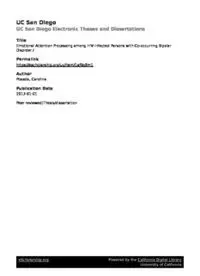
Emotional Attention Processing among HIV-Infected Persons with Co-occurring Bipolar PDF
Preview Emotional Attention Processing among HIV-Infected Persons with Co-occurring Bipolar
UC San Diego UC San Diego Electronic Theses and Dissertations Title Emotional Attention Processing among HIV-Infected Persons with Co-occurring Bipolar Disorder / Permalink https://escholarship.org/uc/item/1xf9q8m1 Author Posada, Carolina Publication Date 2013 Peer reviewed|Thesis/dissertation eScholarship.org Powered by the California Digital Library University of California UNIVERSITY OF CALIFORNIA, SAN DIEGO SAN DIEGO STATE UNIVERSITY Emotional Attention Processing among HIV-Infected Persons with Co-occurring Bipolar Disorder A dissertation submitted in partial satisfaction of the requirements for the degree Doctor of Philosophy in Clinical Psychology by Carolina Posada Committee in charge: University of California, San Diego Professor David J. Moore, Chair Professor Igor Grant, Co-Chair Profesor Colin Dep Professor Steven Paul Woods San Diego State University Profesor Paul Gilbert Professor Scott C. Roesch 2013 Copyright Carolina Posada, 2013 All rights reserved. The Dissertation of Carolina Posada is approved, and it is acceptable in quality and form for publication on microfilm and electronically: ________________________________________________________________________ ________________________________________________________________________ ________________________________________________________________________ ________________________________________________________________________ ________________________________________________________________________ ________________________________________________________________________ Co-Chair ________________________________________________________________________ Chair University of California, San Diego San Diego State University 2013 iii TABLE OF CONTENTS Signature Page ................................................................................................................... iii Table of Contents ............................................................................................................... iv List of Tables .................................................................................................................... vii List of Figures .................................................................................................................. viii Acknowledgements ............................................................................................................ ix Vita .......................................................................................................................................x Abstract of the Dissertation .............................................................................................. xii Chapter 1: Introduction ........................................................................................................1 Prevalence of HIV Infection and Bipolar Disorder in the General Population .............1 Prevalence of HIV Infection Among Individuals with Bipolar Disorder ......................1 HIV Infection .................................................................................................................2 Brain Systems Affected in HIV .....................................................................................2 Neuropsychological Functioning in HIV Infection .......................................................4 Emotional Dysregulation in HIV Infection ....................................................................6 Bipolar Disorder.............................................................................................................7 Brain Systems Affected in Bipolar Disorder .................................................................9 Neuropsychological Functioning in Bipolar Disorder ...................................................9 Emotional Cognition ....................................................................................................11 Emotional Attention .....................................................................................................12 Emotional Cognition in HIV Infection ........................................................................14 Emotional Cognition in Bipolar Disorder ....................................................................15 HIV-Transmission Risk Behaviors ..............................................................................17 Preliminary Studies ......................................................................................................18 iv Summary ......................................................................................................................20 Aims and Hypotheses ..................................................................................................21 Primary Aim...........................................................................................................21 Secondary Aim.......................................................................................................22 Hypothesis 2.1..................................................................................................22 Hypothesis 2.2..................................................................................................22 Exploratory Aim ....................................................................................................22 Chapter 2: Methods ............................................................................................................23 Participants ...................................................................................................................23 Inclusion Criteria ...................................................................................................25 Exclusion Criteria ..................................................................................................25 Measures ......................................................................................................................26 Beck Depression Inventory-II ................................................................................26 Risk Assessment Battery........................................................................................26 Composite International Diagnostic Interview ......................................................26 Young Mania Rating Scale ....................................................................................27 Neuropsychological Battery ...................................................................................27 Verbal fluency. .................................................................................................27 Attention/working memory. .............................................................................27 Learning. ..........................................................................................................27 Memory. ...........................................................................................................27 Speed of information processing. ....................................................................28 Executive functions. .........................................................................................28 Motor................................................................................................................28 v Procedures ....................................................................................................................31 Chapter 3: Data Analytic Plan ...........................................................................................33 Statistical Analysis .......................................................................................................33 Primary Aim, Hypothesis 1 ..........................................................................................33 Secondary Aim, Hypotheses 2.1 and 2.2 .....................................................................33 Exploratory Aim, Hypothesis 1 ...................................................................................34 Independent Variables ...........................................................................................34 Dependent Variables (Outcome Measures) ...........................................................34 Affective go/no-go task individual variables. ..................................................34 Affective go/no-go task combined variables. ..................................................34 Neuropsychological battery. ............................................................................35 RAB. ................................................................................................................35 Chapter 4: Results ..............................................................................................................36 Demographics and Disease Characteristics .................................................................36 Individual AGNT Conditions ......................................................................................39 Combined AGNT Conditions ......................................................................................39 Omission and Commission Errors ...............................................................................42 Mood States .................................................................................................................45 HIV-Transmission Risk Behaviors ..............................................................................47 Chapter 5: Discussion ........................................................................................................49 References ..........................................................................................................................62 vi LIST OF TABLES Table 1. Proportion of Individuals Classified into Mood Groups .....................................25 Table 2. AGNT Block Trials .............................................................................................30 Table 3. Demographic and HIV Disease Characteristics of the Groups ............................37 Table 4. Psychiatric Characteristics of the Groups ............................................................38 Table 5. AGNT Individual Variables .................................................................................40 Table 6. AGNT Combined Variables ................................................................................43 Table 7. AGNT RT Variables Combined across all Conditions ........................................44 Table 8. Omission and Commission Errors across Groups ...............................................46 Table 9. AGNT Variables across Mood States ..................................................................47 Table 10. Risky Behaviors across the Groups ...................................................................48 vii LIST OF FIGURES Figure 1. Significant interaction between HIV and bipolar disorder on the go happy/no-go sad condition (CR) of the AGNT. .....................................................42 Figure 2. Significant interaction between HIV and bipolar disorder on the combined go happy condition (CR) of the AGNT.................................................44 viii ACKNOWLEDGEMENTS This research is supported by HNRC Developmental Grant: “Emotional Cognition in HIV Infection and Bipolar Disorder” (HNRC 939); Texting to improve adherence in HIV+ with bipolar disorder, (R03 MH078785, David J. Moore, PI); HIV Neurobehavioral Research Center, HNRC NIMH/CSPAR Award Number P30MH062512, Igor Grant, PI); Translational Methamphetamine AIDS Research Center, TMARC (NIH/NIDA Award Number P50DA026306, Igor Grant, PI), and California HIV/AIDS Research Program IDEA Award (ID09-SD-047, David J. Moore, PI). ix
